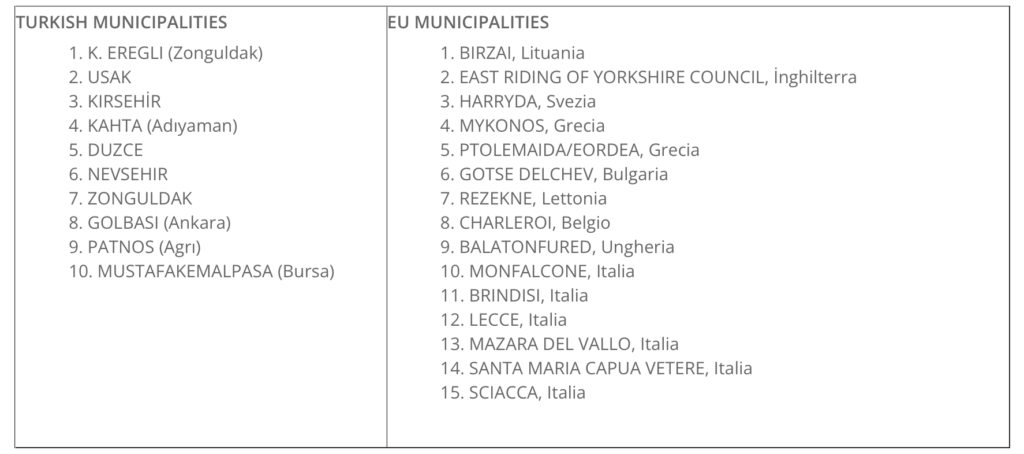On 13th January, CITIES project final conference took place in Dordrecht (NL). Workshops and exchange of experiences at the International Conference on Town-twinning Initiatives.
Town twinning as a way to enhance local tolerance and mutual understanding, to help and facilitate integration, to multiply relations: these are some of the focus points emerged from the Conference held in Dordrecht, The Netherlands, on 13th January. Coming to its conclusion, CITIES project revealed a valuable and effective means to develop citizens’ participation at a local level.
The event – organised by ALDA, together with the Municipality of Dordrecht, the Netherlands, and its partner BMC – was the final conference of CITIES (Creativity and Innovation in Town-twinning Initiatives in Europe and South-eastern Europe), a EU-funded project, led by ALDA, aimed at revitalising and creating town-twinning relationships through innovative methods in Europe.
“Dordrecht has always been an international city. This very town-hall was built in the 14th century as a trading place to attract textile merchants from Antwerp. No wonder twinning started in a very early phase. – declared A.A.M. Brok, Mayor of Dordrecht upon his welcome speech – The first official Dordrecht twinning with Hastings in England started in the seventies of the last century, more recent are the twinnings in Africa with Bamenda in Cameroon and with Dordrecht in South-Africa and latest are our contacts with Varna in Bulgaria to have a connection with the new European countries. Dordrecht thinks that twinning adds important aspects to its society, because twinning for us is not just helping other cities but especially learn from our twinning partners as well. And that exchanging best practices of excellent ideas will prove to be inspirational and fruitful .– the Mayor of Dordrecht concluded – You know what we say: Twinning is Winning.”
To the Conference took part approx. 45 foreign representatives part originating, inter alia, from Albania, Lithuania, Macedonia and Bulgaria. Further participation consisted of representatives of Dutch municipalities, the foundations town twinning and the COS Zuid Holland (Centre for International cooperation).
“Twinning between cities and towns across Europe has existed successfully for a good many years – stated in his opening speech Mr Per Vinther, ALDA President – but lately a certain “twinning fatigue” has set in. The more traditional culture and sport elements of a partner relationship between cities seem to have lost their attraction and the injection of new life – and purpose – into Town Twinning is clearly needed. Joined by a number of dedicated partners the Association of Local Democracy Agencies has taken up this challenge within the EU Programme “Europe for Citizens” with the objective of identifying new ways and skills of co-operation between partner cities which bring together all players in the community: local authorities, business and civil society.
ALDA has been working in the Balkans for more than ten years in a bottom-up approach to encourage local authorities and civil society organisations to co-operate about improving living conditions in their community, involving also transfer of know-how and best practices from international partners in what could be called multilateral twinning. Based on this experience – pointed out Mr Per Vinther – ALDA plays a relevant role in promoting city-to-city co-operation drawing on its members and partners in the rest of Europe. Town Twinning is but one component of the effort to bring EU populations closer together and embrace the objective and values of a united Europe so the inclusion of cities and national associations of local authorities from South East Europe in the CITIES project has been an important element for ALDA.
Dissemination of the ideas and suggestions which have been tabled during various conferences in the partner countries and in the concluding international conference in Dordrecht – declared ALDA President – should encourage other cities across Europe to engage in Town Twinning as a means to share experience and learn from each other, to bring the countries of South East Europe closer to the EU and to promote active citizenship in general.”
The project was based on a partnership of six associations of municipalities in Albania, Slovakia, North Macedonia, two in Bulgaria and Lithuania. During the year it lasted, the partners organised national workshops aiming to identify innovative tools for town-twinning and the variety of fields in which such a relationship can develop. This final conference taking place in Dordrecht has gathered twinning experiences from Dutch municipalities and best practices from all over Europe from the partner countries and ALDA.
Six workshops were held in smaller groups allowing concrete discussions and encounter of many municipality representatives, in order to conclude on new cooperation projects, that could lead to future town-twinning agreements. The International Twinning Conference for Innovation provided information on international cooperation at local level today, and showed the possibilities that the ‘Europe for Citizens’ programme of the European Union offers.
The Cities project has been implemented by the Association of Local Democracy Agencies (ALDA) in cooperation with the Association of Municipalities from Albania, the Regional Association of Municipalities “Central Stara Planina” and the Union of Bulgarian Black Sea Local Authorities from Bulgaria, the Association of Local Authorities in Lithuania, ECOVAST –National section for Republic of Macedonia, the International Co-operation Agency of the Association of Netherlands Municipalities, and the Union of Towns and Cities of Slovakia. The project was launched on 1st February 2010 and will finish on 31st January 2011.
